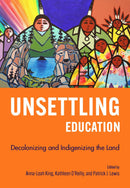Description
Dr. Anna-Leah King is the Chair of Indigenization, the Education Core Studies Chair, and an Associate Professor in the Faculty of Education at the University of Regina. She is Anishnaabekwe from Wikwemikong Unceded Reserve, Manitoulin Island, Ontario. Dr. Kathleen O'Reilly is a Graduate Program Coordinator and Associate Professor of Indigenous Education at the First Nations University of Canada. Her expertise is in anti-racist pedagogy, Indigenizing teaching and curricula, and Indigenizing the academy. Dr. Patrick Lewis is a Professor Emeritus of Early Childhood Education at the University of Regina. His research interests include treaty education and Indigenization. In June 2021, he was honoured by the Faculty’s Education Indigenous Circle for being a valued contributor.
This edited collection tackles “unsettling” as an emerging field of study that calls for settlers to follow Indigenous leadership and relationality and work toward disrupting the colonial reality through their everyday lives. Bringing together Indigenous and non- Indigenous scholars and activists, Unsettling Education considers how we can reconcile and transcend ongoing settler colonialism. The contributors reflect on how the three concepts of unsettling, Indigenization, and decolonization overlap and intersect in practical and theoretical ways. Questions are raised such as how can we recognize and address historical and current injustices that have been imposed upon Indigenous Peoples and their lands? How can we respect the fundamental and inherent sovereignty and rights of Indigenous Peoples as we work toward reconciliation? And how do we work collectively to build more equitable and just communities for all who call Canada home? Unsettling Education is well suited for college and university courses in Indigenous studies or education that focus on decolonization, land-based learning, Indigenization, unsettling, and reconciliation.
FEATURES
acting as a foundational guide for settlers for engaging with truth and reconciliation, this collection includes writings by Indigenous scholars from a diverse range of communities whose insights can translate to policy changes, new dialogues, and structural frameworks
students are asked to focus on personal awareness, engagement, and transformation by unpacking identity, reflecting upon privilege and baggage, and disrupting the colonial underpinnings of everyday life
pedagogically rich with critical thinking questions, key terms, and further readings, this volume is beneficial for instructors looking to engage with decolonizing, Indigenizing, and unsettling practices in the classroom
Introduction
Anna-Leah King, Kathleen O’Reilly, and Patrick J. Lewis
PART I: UNSETTLING
Chapter 1: Let’s Unpack That! Decolonization and Indigenization while Unsettling Settler Academic Practice
Jessie King
Chapter 2: Moving from Uncertainty to Empathy: Reconciliation through Indigenization
Doris Jeanne MacKinnon
Chapter 3: Red River Removals: Unsights and Hidden Histories of Water Stories through Critical Place Inquiry and Earth-Based Art
Katya Adamov Ferguson
Chapter 4: The Canadian Family Farm: A Case Study of a Settler Colonial lieu de mémoire
Teiji Wallace-Lewis
PART II: INDIGENIZATION
Chapter 5: Inspiring Success in Indigenous Education in the 21st Century: A Moral Imperative—Education as if Children and Youth, Our Relationships, and the Natural World/Life Mattered
Rita Bouvier
Chapter 6: Sqilxw Woman: She Brings Bundles
Mariel Belanger
Chapter 7: Anishinaabeodziiwin miinwaa Gikendasswin: Anishinaabe Ways of Knowing and Being through Relationality
Barbara Moktthewenkwe Wall
Chapter 8: Deyéh Kédzī́hłāʼ īyéh Dene Zā́géʼ Nū́tsédī́ sį̄́: We Work Together So the Kaska Language Will Be Strong
Martina Volfová, Emeral Poppe, Paul Caesar-Jules, and Patrick Moore
Chapter 9: Walking a Common Path: Decolonizing Land-Based Education with the More-than-Human World
Angela McGinnis and Adela Tesarek Kincaid
Chapter 10: Relationships and Reciprocity in Mathematics Education
Ruth Beatty and Colinda Clyne
Chapter 11: Co-Creating and Claiming Spaces: Indigenous Language Activists, Partners/Accomplices/Allies, and Higher Education
Denise Kennedy and Andrea Sterzuk
Chapter 12: Kiihtahiyamiininak Ochiimakan Tah Kiskenimisowak, “Our Heritage Language Tells Me Who We Are”
Stan Wilson
PART III: DECOLONIZATION
Chapter 13: Wena ka tapaymish ekwa kakway ka dipayhtamun? (Who Claims You and What Do You Claim?)
Melanie Griffith Brice, Russell Fayant, Andrea Sterzuk, and Patrick J. Lewis
Chapter 14: An Exploration of the Dutiful and Demonized Ikwewag (Women) in Sacred Story: A Decolonial Allegory on Resistance and Transformational Power within Education
Amy Farrell
Chapter 15: Indigenous Teacher Education in the Métis Homeland: Narratives of Love, Culture, and Resistance
James Alan Oloo
Chapter 16: It’s About Damn Time: Decolonizing and Indigenizing Possibilities in Teacher Education
Nikki Yee, Lynn Wainwright Kakageeshis, and Candace Kaleimamoowahinekapu Galla
Chapter 17: Story Walk: Indigenous and Decolonial Approaches to Reviving Educational Leadership Praxis
Ee-Seul Yoon and Amy Farrell
Chapter 18: Land, Belonging, and Rootedness: Home Is in the Stories
Anna-Leah King, Kathleen O’Reilly, and Patrick J. Lewis
Contributor Biographies


